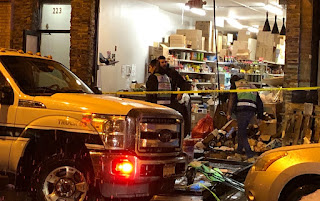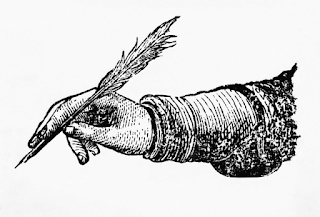 |
| 6-December-2021 |
When I started this series I decided that I would do two things differently than before. First, I’d focus only on terrorist incidents that occurred in the United States, and second that I’d choose the examples from the years 1970 to 2000. Both of these were intended to drive home to my students, and those of you who read this, that the United States’ experience of terrorism long predates the attacks of Sept. 11, 2001, and that, in the vast majority of cases, attacks were carried out on Americans, by Americans, in pursuit of goals deeply embedded in the political and social culture of the United States.
 |
| Anti-Semitic extremists attacked a kosher market in Jersey City, killing 3, Dec. 10, 2019. |
In short, our terrorism problem has historically been a domestic one, not one rooted in foreign attackers coming here to strike American society in the name of causes foreign to our soil. The dozen posts in this series (which began here) make that point pretty clearly. When we talk about the experience of terrorism in the United States, we are generally talking about Americans at war with America.
For this final installment in the series, I decided to look at the week Dec. 5-11 for every year from 1970 through 2019 (the Global Terrorism Database has been updated to include all of 2019). What I found was interesting, and not terribly surprising. In all I found 55 separate incidents, 40 of them from 1970-2000, and a further 15 from 2001-2019. The most active decade was the 1970s, accounting for 19 incidents. The fewest attacks occurred in the 1990s (seven incidents) and 2000s (three incidents).
Ominously, things start to escalate in the mid-2010s, however, with 15 separate attacks in the week of Dec. 5-11 from 2014-2019. This is consistent with the overall pattern we see if we look at all attacks in the United States from 1970-2019. The Global Terrorism Database records 3,004 over this timeframe, with peaks in the 1970s, and a steady state through the 1980s and 1990s when incidents averaged around 50 attacks a year, give or take. There is a big decline after 2001, approaching low double digits in some year. But starting around 2012 or 2013 the number of attacks begins to dramatically tick upwards.
The trends become clear if we break it down by 5-year periods. From 2005-2009 there were 65 separate terrorist incidents recorded. From 2010-2014 that number rises to 96. But from 2015-2019 that number soars to 316 separate terrorist incidents, a whopping 386 percent increase from 2005-2009.
The takeaway is clear, and chilling. If these kinds of increases continue, we are looking at the possibility of terrorism in the United States rising to levels we haven’t seen in nearly a half century. That worries me.
And now, for this week’s final look back, we turn to the most recent representative week available in the GTD, Dec. 5-11, 2019.
For this final installment in the series, I decided to look at the week Dec. 5-11 for every year from 1970 through 2019 (the Global Terrorism Database has been updated to include all of 2019). What I found was interesting, and not terribly surprising. In all I found 55 separate incidents, 40 of them from 1970-2000, and a further 15 from 2001-2019. The most active decade was the 1970s, accounting for 19 incidents. The fewest attacks occurred in the 1990s (seven incidents) and 2000s (three incidents).
Ominously, things start to escalate in the mid-2010s, however, with 15 separate attacks in the week of Dec. 5-11 from 2014-2019. This is consistent with the overall pattern we see if we look at all attacks in the United States from 1970-2019. The Global Terrorism Database records 3,004 over this timeframe, with peaks in the 1970s, and a steady state through the 1980s and 1990s when incidents averaged around 50 attacks a year, give or take. There is a big decline after 2001, approaching low double digits in some year. But starting around 2012 or 2013 the number of attacks begins to dramatically tick upwards.
The trends become clear if we break it down by 5-year periods. From 2005-2009 there were 65 separate terrorist incidents recorded. From 2010-2014 that number rises to 96. But from 2015-2019 that number soars to 316 separate terrorist incidents, a whopping 386 percent increase from 2005-2009.
The takeaway is clear, and chilling. If these kinds of increases continue, we are looking at the possibility of terrorism in the United States rising to levels we haven’t seen in nearly a half century. That worries me.
And now, for this week’s final look back, we turn to the most recent representative week available in the GTD, Dec. 5-11, 2019.
- Dec. 5, 2019 — El Paso, TX: Unidentified perpetrators broke into and set fire to St. Thomas Aquinas Roman Catholic Church. It was the fourth attack on an El Paso church that year. No one was injured in the incident, but damage to the church was extensive.
- Dec. 5, 2019 — Memphis, TN: A cellphone tower was set afire in the Hayden Place neighborhood of Memphis. While no group claimed responsibility, law enforcement officials believe the fire was set by extremists who embrace the conspiracy theory linking 5G radio waves to the COVID-19 pandemic.
- Dec. 5, 2019 — Memphis, TN: In the second arson attack on a cellphone tower in Memphis on the same day, unknown perpetrators set fire to a tower in the Binghampton neighborhood. As with the other attack, 5G conspiracy theorists were suspected. No one was injured in either attack.
- Dec. 6, 2019 — Pensacola, FL: A member of the Saudi Arabian Air Force opens fire on a classroom at the US Naval Air Base in Pensacola. Four people, including the attacker, were killed and another eight were wounded. The Islamist group Al Qaida in the Arabian Peninsula claimed responsibility. The attacker posted criticism of US wars and praise of Osama bin Laden on social media just hours before the shooting.
- Dec. 7, 2019 — Fayetteville, AR: A gunman ambushed and opened fire on police officer Stephen Carr while he was standing outside a police station. Carr was killed instantly and the gunman was killed by responding police. No group claimed responsibility, but the attacker was identified by sources as an anti-police extremist.
- Dec. 10, 2019 — Jersey City, NJ: Two gunmen opened fire on the JC Kosher Supermarket in Jersey City. Three people were killed and three others were injured in the attack. The gunmen, anti-Semitic extremists, left a note in their vehicle which said: “I do this because my creator makes me do this and I hate who he hates.” The two were subsequently connected to the killing of a police detective earlier in the day, and a taxi driver the previous week.
- Dec. 11, 2019 — Franklin Lakes, NJ: An assailant set fire to the Roman Catholic Church of the Most Blessed Sacrament in Franklin Lakes. The assailant was injured in the attack, which destroyed the church. In his trial a year later, the attacker was described as trying to achieve “religious purity” by setting fire to the church.






No comments